

My top tips for using social media for professional networking and more. Yesterday, I participated in a bit of a panel discussion at a planning day for the USQ Library leadership team about using social media to build personal learning networks, develop a professional identity and reputation, and amplify the good things we and our colleagues are doing.
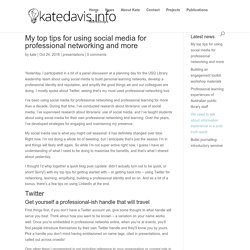
I mostly spoke about Twitter, seeing that’s my most used professional networking tool. OMG Becky. PD is Getting So Much Better!! 21CLHK 18 Building Online Presence for Effective Online Professional Development Matt Harris Ed.D.
INF532 Cohort Artefacts. Emerging Literacies (RU515) Week 3 Toolkit: Connected Learning (Global) Digital Learning Environments. 6 Great Websites That Offer Free Online Courses. November 4, 2016 One of the best advantages of the Internet and web technologies is that they have levelled the educational playground making education and learning accessible to anyone anywhere in the world with a computer and Internet connection.
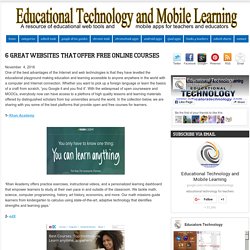
Whether you want to pick up a foreign language or learn the basics of a craft from scratch, 'you Google it and you find it'. With the widespread of open courseware and MOOCs, everybody now can have access to a plethora of high quality lessons and learning materials offered by distinguished scholars from top universities around the world. In the collection below, we are sharing with you some of the best platforms that provide open and free courses for learners. 3 Reasons Why You Should Share and 3 Things You can Do to Start Sharing. I am back on my soapbox… …because I continue to see great things happening in classrooms, but get blank stares, when I ask, if these things are being shared beyond the school building.
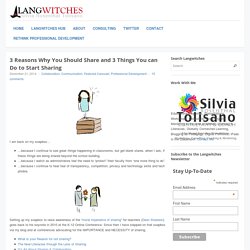
…because I watch as administrators feel the need to “protect” their faculty from “one more thing to do”. …because I continue to hear fear of transparency, competition, privacy and technology skills and tech phobia. Setting up my soapbox to raise awareness of the “moral imperative of sharing” for teachers (Dean Shareski) goes back to his keynote in 2010 at the K-12 Online Conference. Since then I have stepped on that soapbox via my blog and at conferences advocating for the IMPORTANCE and NECESSITY of sharing. George Couros, recently published 4 Reasons People Don’t Blog, which are in essence the same reasons why people don’t share (just substitute “blogging” for “sharing”) Teen lives depend on the Internet. What happens when they can’t afford it? “What are some of the things you would like to talk about today?”
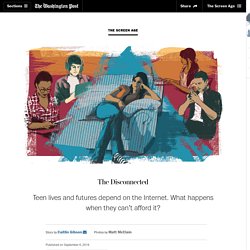
Lim asks DJ. “About college?” DJ asks. In a matter of weeks she’ll be a high school junior. “Sure,” Lim says. DJ twists a lock of dark hair between her fingers. NMC/CoSN Horizon Report: 2016 K-12 Edition. COFA Online Gateway. Contact Us Home.
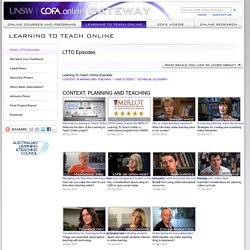
Australian Flexible Learning Framework. From evidence to action - it’s time to join the dots. A new research report says it's time to 'join the dots' and scale up successful examples of flexible learning systems to meet the 21st Century education needs of all Australian school students.

The Case, released by the Dusseldorp Forum, brings together the findings of national consultations, a review of research evidence, and a review of current education policy and practice. The independent philanthropic foundation highlights the fact that one in five high-school-aged students in Australia are currently not attending school. You are a global educator. It's time to start thinking like one. True online global collaboration takes place when students with different cultures and points of view gather information and co-create artifacts together, building knowledge and sharing with the world.
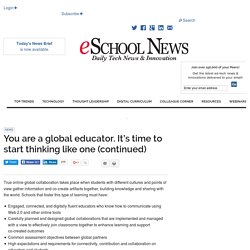
Schools that foster this type of learning must have: Educators who participate in online global collaboration need professional support in understanding how to build engaging and successful relationships with others at a distance so that deeper global learning is realized. Networks, Networking and Network Literacy – Part One – Linking Learning. As I continue my research into how teachers experience learning through Personal Learning Networks (PLNs), I am spending a lot of time learning about networks, networking and network literacy.
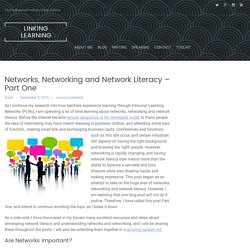
Before the internet became almost ubiquitous in the developed world, to many people the idea of networking may have meant dressing in business clothes, and attending some type of function, making small talk and exchanging business cards. Conferences and functions such as this still occur, and certain industries still depend on having the right background and knowing the ‘right’ people. However, networking is rapidly changing, and having network literacy now means more than the ability to balance a serviette and hors d’oeuvre while also shaking hands and looking impressive. This post began as an attempt to take on the huge area of networks, networking and network literacy.
However, I am realising that one blog post will not do it justice. Students Weigh In On Flipped Classrooms. By Jon Bergmann I am about to complete a book about the relationship between flipped learning and homework.
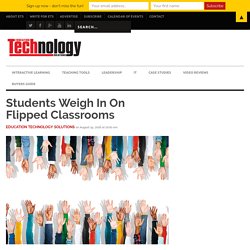
While writing the book, I realised that I needed to hear from students about their perceptions and thoughts about flipped homework. Learning Online – Questions Of Quality And Impact - Education Technology Solutions. As learners increasingly engage online anywhere, anytime, in informal and formal contexts, there are questions related to the quality and impact of the learning.
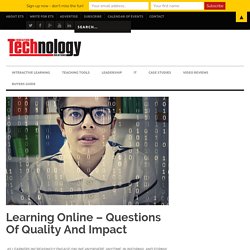
Free online courses. INF532 Artefact and exegesis. Why is Good Instructional Design More Important than Ever in the Modern World? Although instructional design as a discipline has been around for decades (and probably was at its height in the 1970’s and 1980’s as a profession, its application and use has diminished in the age of easy to use software and access to and use of Internet. This is partly because it is so easy to create a course of almost any type, add as many “bells and whistles” as you like and then widely distribute it to a given audience. But in paying less attention to instructional design than we should we have lost something important and it is therefore high time we recognized that it is more important than ever in the modern world.
After all, instructional design is the approach which helps to keep the process of training, coaching or development of any kind (on or off line) to be well-targeted and on track to meet the needs of the individual(s) at which it is aimed. Related Resources. From Hierarchical to Networked:Ensuring Lifeready and Lifeworthy Learning in the Digital Age - Home. Network Learning: Working Smarter with PKM. “In the period ahead of us, more important than advances in computer design will be the advances we can make in our understanding of human information processing – of thinking, problem solving, and decision making …” – Herbert Simon, Economics Nobel-prize winner (1968) The World Wide Web is changing how many of us do our work as we become more connected to information and each other. In California, Ray Prock, Jr. (2010) uses a Web-based note system to store messages, manage his financial risk and stay on top of the multiple factors necessary to run a successful dairy farm.
He is constantly learning as he works and has found a method to keep up, thanks to the Internet. For many, however, keeping up isn’t easy. The amount of information flowing through the Internet today is measured in exabytes, or billions of gigabytes. Quick CoP start-up guide. REVIEW: The Connected Educator - Read Write Respond. Flickr photo shared by mrkrndvs under a Creative Commons ( BY-SA ) license The Connected Educator, by Sheryl Nussbaum-Beach and Lani Ritter Hall, provides a thorough introduction to becoming more connected. Through a mixture of anecdotes, elaborations and questions, the authors invite those wishing to adapt their practice for a participatory culture made possible by Web 2.0. Although technology plays its part throughout, this book is about the educator as learner first and in the process taking control of their own professional development.
At the heart of this change are three layers integral to the connected learning communities: Guides. These user guides will take you through some of the steps for getting started with some of our favourite web tools and exploring the more advanced features of some of these tools and apps. All of the guides can also be found at Bright Ideas on Storify and the video guides are also available on the Bright Ideas YouTube channel. We will be updating guides regularly and adding new services. Please feel free to request a guide in the comments or email brightideasblog@outlook.com Twitter Getting started. How Information Fluency Skills Help You as a Teacher. Tired of receiving work from your students with incorrect information from questionable sources and unreliable websites?
Tired of seeing kids hit the first link on their Google search as the extent of their research, or using Wikipedia as their only source for information? Have no fear, because Information Fluency skills are the answer. You can teach students to use a framework that guides them through vetting information and determining its accuracy before using it in their projects. That framework is—you guessed it—Information Fluency. When you systematically go through these steps with your students, they will learn how to craft solid cases on their own. Buchanan Scan30 4. Creating your Personal Learning Network (PLN) PLN Starter Kit. Should Every Teacher in the World Really be on Twitter? - Read Write Respond.
So often it is said, teachers must be on Twitter. For example, Peter DeWitt’s provides 3 Reasons You Need Twitter More Than It Needs You! While Mark Barnes gives 5 Reasons Every Person in the World Should Be On Twitter. The question though is whether Twitter is the answer? 6 Great Videos for Teaching Media Fluency. There’s no denying the influence of digital media in our daily lives. The “WHY” Guide to #Edchat topics – EDUWELLS. Bridging the Digital Divide. As people working in the information industry, the ‘digital divide’ is an important issue that many of you will be aware of. Should your online course sound like Serial? Krista Tippett knows how to connect with audiences. She hosts a radio show that airs on more than 400 stations across the country.
Twitter for Newbies: why get connected? – Linking Learning. It’s 2016, and we live in a social media age. Australian curriculum metadata in the library cloud: Part 1 why. – Cloud Librarian DownUnder. In late 2015 the library started a small pilot project with SCIS to explore if and how Australian curriculum metadata could be included into the global bibliographic record. The importance of school libraries in the Google Age. Kay Oddone In Australia, access to the internet is almost ubiquitous. Assessment & Teaching of 21st Century Skills - ATC21S.
The Padagogy Wheel developed by Allan Carrington. It Is Not About the Apps, It Is About The Pedagogy. Librarian Approved: 30 Ed-Tech Apps to Inspire Creativity and Creation. Tool discovery is often a challenge for teachers interested in finding ways to use technology that will change the way they and their students work. With so much going on in the classroom, many teachers don’t have the time to test out various apps and find the perfect tool to meet their needs. 8 digital skills we must teach our children. 3 keys to ride the future: - Curate to filter & aggregate the best - Make it simple to find - Deliver the best.
Edsurge. TEDxKC - Michael Wesch - From Knowledgeable to Knowledge-Able. Robert Gagne's Nine Steps of Instruction: Do’s and Don’ts in E-Learning - Origin Learning Blog - A Elearning Solutions BlogOrigin Learning Blog – A Elearning Solutions Blog. Sorry but You're Not a Connected Educator Unless - Brilliant or Insane.
Digital Artefact and References. How does a teaching team benefit from being a community of practice? INF532 - Julie Lindsay on Diigo. #FlipboardChat Summary: Creative Magazine Ideas for New Graduates. Networks and Webs – inspired by a metaphor – Linking Learning. Social Configurations of Learning – Communities, Groups, Nets and Sets – Linking Learning. INF532.